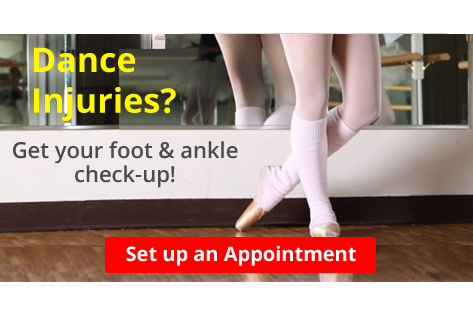Items filtered by date: March 2020
Flip Flops and How They Affect the Feet
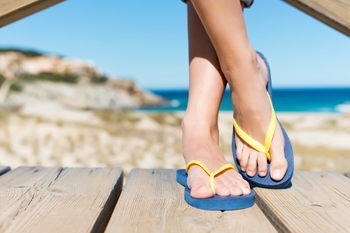 Many people enjoy the ease of wearing flip flops. They have become a popular shoe to wear in the warmer months, and are available in bright colors. As attractive as they may seem to frequently wear, research has indicated there may be injuries that can happen to the feet due to their use. The feet may become tired and achy as a result of the toes grasping the shoe so it can remain on the foot. Many flip flops are designed without having a built in arch, which may cause the feet to roll inward. It can be beneficial to choose flip flops that have a strap in the back, in addition to wearing more supportive shoes every other day. If you would like additional information about how flip flops may affect the feet, please consult with a podiatrist.
Many people enjoy the ease of wearing flip flops. They have become a popular shoe to wear in the warmer months, and are available in bright colors. As attractive as they may seem to frequently wear, research has indicated there may be injuries that can happen to the feet due to their use. The feet may become tired and achy as a result of the toes grasping the shoe so it can remain on the foot. Many flip flops are designed without having a built in arch, which may cause the feet to roll inward. It can be beneficial to choose flip flops that have a strap in the back, in addition to wearing more supportive shoes every other day. If you would like additional information about how flip flops may affect the feet, please consult with a podiatrist.
Flip-flops are not always the best choice of footwear. If you have any concerns about your feet or ankles, contact one of our podiatrists from Advanced Ankle & Foot Surgeons. Our doctors will assist you with all of your foot and ankle needs.
Flip-Flops and Feet
When the weather starts warming up, people enjoy wearing flip-flops. Flip-flops are comfortable, stylish, and easy to slip on and off; they're perfect for any summer beach goer. However, these shoes can cause harm to the feet.
How Can Flip-Flops Affect Me Long-Term?
- Ankle problems
- Hip problems
- Lower back problems
- Pain in the balls of the feet
- Problems with foot arches
- Changes in the way you walk
Are There Injuries Associated with Flip-Flops?
Yes. Since flip-flops are relatively weak and do not provide the same amount of support as sneakers, people who wear flip-flops regularly are more susceptible to injuries. On top of that, the open nature of the shoe makes your feet more prone to other problems, such as cuts and even infections. Common injuries and ailments include:
- Sprained ankles
- Blisters
- Infections
- Cuts and Scrapes
I like Wearing Flip-Flops. Are There Safe Alternatives?
When buying flip-flops, try to find ones that have sturdy soles and that are made of high-quality materials that will support for your feet. These flip-flops will cost more but will also last longer as a result.
If you have any questions please feel free to contact our office located in O'Fallon, and New Baden, IL . We offer the newest diagnostic and treatment technologies for all your foot and ankle needs.
Why Do Blisters Form?
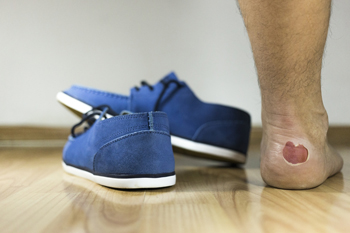 A blister generally forms as a result of excess friction. When a blister develops on the feet, walking, running, and performing daily activities may be difficult to accomplish. Blisters are considered to be common among those who enjoy sports and hiking. They are defined as a pocket of fluid that forms over the affected portion of skin, which is the body’s natural method of protecting the damaged skin. When new skin has formed, the blister will gradually drain. There are methods that can be implemented which may help to prevent blisters. These may include wearing shoes that fit correctly, and wearing socks that are made of breathable materials. Additionally, it may help to wear cushioned insoles that can provide extra comfort. If you are afflicted with blisters on the feet, it is advised that you speak with a podiatrist who can properly treat this condition.
A blister generally forms as a result of excess friction. When a blister develops on the feet, walking, running, and performing daily activities may be difficult to accomplish. Blisters are considered to be common among those who enjoy sports and hiking. They are defined as a pocket of fluid that forms over the affected portion of skin, which is the body’s natural method of protecting the damaged skin. When new skin has formed, the blister will gradually drain. There are methods that can be implemented which may help to prevent blisters. These may include wearing shoes that fit correctly, and wearing socks that are made of breathable materials. Additionally, it may help to wear cushioned insoles that can provide extra comfort. If you are afflicted with blisters on the feet, it is advised that you speak with a podiatrist who can properly treat this condition.
Blisters are prone to making everyday activities extremely uncomfortable. If your feet are hurting, contact one of our podiatrists of Advanced Ankle & Foot Surgeons. Our doctors can provide the care you need to keep you pain-free and on your feet.
Foot Blisters
Foot blisters develop as a result of constantly wearing tight or ill-fitting footwear. This happens due to the constant rubbing from the shoe, which can often lead to pain.
What Are Foot Blisters?
A foot blister is a small fluid-filled pocket that forms on the upper-most layer of the skin. Blisters are filled with clear fluid and can lead to blood drainage or pus if the area becomes infected.
How Do Blisters Form?
Blisters on the feet are often the result of constant friction of skin and material, usually by shoe rubbing. Walking in sandals, boots, or shoes that don’t fit properly for long periods of time can result in a blister. Having consistent foot moisture and humidity can easily lead to blister formation.
Prevention & Treatment
It is important to properly care for the affected area in order to prevent infection and ease the pain. Do not lance the blister and use a Band-Aid to provide pain relief. Also, be sure to keep your feet dry and wear proper fitting shoes. If you see blood or pus in a blister, seek assistance from a podiatrist.
If you have any questions, please feel free to contact our office located in O'Fallon, and New Baden, IL . We offer the newest diagnostic and treatment technologies for all your foot care needs.
Possible Foot Conditions From Pregnancy
Research has indicated that more than half of pregnant women experience uncomfortable foot conditions as it gets closer to delivering their child. A common ailment that is experienced can include flat feet, or collapsed arches, which can be a result of the additional weight the feet endure. Heel pain may come from plantar fasciitis which can happen when the tissue that runs along the bottom of the foot becomes inflamed. Hormonal changes may cause the condition that is known as cracked heels to develop, and relief may be found when a good moisturizer is frequently applied. If you would like additional information about how pregnancy can affect the feet, it is suggested that you consult with a podiatrist.
Pregnant women with swollen feet can be treated with a variety of different methods that are readily available. For more information about other cures for swollen feet during pregnancy, consult with one of our podiatrists from Advanced Ankle & Foot Surgeons. Our doctors will attend to all of your foot and ankle needs.
What Foot Problems Can Arise During Pregnancy?
One problem that can occur is overpronation, which occurs when the arch of the foot flattens and tends to roll inward. This can cause pain and discomfort in your heels while you’re walking or even just standing up, trying to support your baby.
Another problem is edema, or swelling in the extremities. This often affects the feet during pregnancy but tends to occur in the later stages.
How Can I Keep My Feet Healthy During Pregnancy?
- Wearing orthotics can provide extra support for the feet and help distribute weight evenly
- Minimize the amount of time spent walking barefoot
- Wear shoes with good arch support
- Wear shoes that allow for good circulation to the feet
- Elevate feet if you experience swelling
- Massage your feet
- Get regular, light exercise, such as walking, to promote blood circulation to the feet
If you have any questions please feel free to contact our office located in O'Fallon, and New Baden, IL . We offer the newest diagnostic and treatment technologies for all your foot and ankle needs.
How to Treat Your Corns
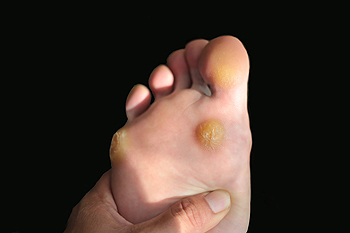 The body’s natural response is to protect itself, which is why the skin may develop a hardened layer of skin in the form of a corn. Corns will typically develop due to an increased level of friction. While this protective layer may be to help the skin of the foot, it can also be very painful and sensitive. To help avoid this, it’s important to wear shoes that put little to no pressure on the feet. If you find your corn to be uncomfortable, some patients have said that soaking the feet in warm water, followed by filing the corn with a pumice stone, can be an effective way to alleviate the pain. If you would like more information on how to best treat your corn, it is recommended that you consult with a podiatrist for professional care and advice.
The body’s natural response is to protect itself, which is why the skin may develop a hardened layer of skin in the form of a corn. Corns will typically develop due to an increased level of friction. While this protective layer may be to help the skin of the foot, it can also be very painful and sensitive. To help avoid this, it’s important to wear shoes that put little to no pressure on the feet. If you find your corn to be uncomfortable, some patients have said that soaking the feet in warm water, followed by filing the corn with a pumice stone, can be an effective way to alleviate the pain. If you would like more information on how to best treat your corn, it is recommended that you consult with a podiatrist for professional care and advice.
Corns can make walking very painful and should be treated immediately. If you have questions regarding your feet and ankles, contact one of our podiatrists of Advanced Ankle & Foot Surgeons. Our doctors will treat your foot and ankle needs.
Corns: What Are They? And How Do You Get Rid of Them?
Corns are thickened areas on the skin that can become painful. They are caused by excessive pressure and friction on the skin. Corns press into the deeper layers of the skin and are usually round in shape.
Ways to Prevent Corns
There are many ways to get rid of painful corns such as:
- Wearing properly fitting shoes that have been measured by a professional
- Wearing shoes that are not sharply pointed or have high heels
- Wearing only shoes that offer support
Treating Corns
Although most corns slowly disappear when the friction or pressure stops, this isn’t always the case. Consult with your podiatrist to determine the best treatment option for your case of corns.
If you have any questions please feel free to contact our office located in O'Fallon, and New Baden, IL . We offer the newest diagnostic and treatment technologies for all your foot and ankle needs.
How to Help Maintain the Health of Your Child’s Feet
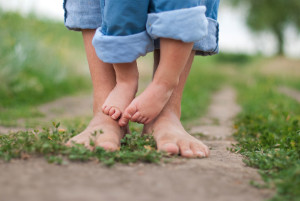 When a child is born, the bones in their feet are comprised of soft cartilage. Research has indicated that it is beneficial for a child to walk barefoot while indoors, as this may help the feet to become stronger. This can happen when the toes grasp the floor, and this generally benefits the entire foot. When your child walks outdoors, it is important to properly measure their feet, as this can help to best determine the correct shoe size. When the first shoes are purchased, it is suggested that they are made of a lightweight and breathable material, in addition to having non-slip soles. Children’s feet grow rapidly, and it is wise to have them measured approximately every six weeks. Many babies are born with flat feet, and the arches will gradually develop as the feet become stronger. If this fails to occur, it is advised that you consult with a podiatrist who can properly diagnose any foot condition your child may have.
When a child is born, the bones in their feet are comprised of soft cartilage. Research has indicated that it is beneficial for a child to walk barefoot while indoors, as this may help the feet to become stronger. This can happen when the toes grasp the floor, and this generally benefits the entire foot. When your child walks outdoors, it is important to properly measure their feet, as this can help to best determine the correct shoe size. When the first shoes are purchased, it is suggested that they are made of a lightweight and breathable material, in addition to having non-slip soles. Children’s feet grow rapidly, and it is wise to have them measured approximately every six weeks. Many babies are born with flat feet, and the arches will gradually develop as the feet become stronger. If this fails to occur, it is advised that you consult with a podiatrist who can properly diagnose any foot condition your child may have.
The health of a child’s feet is vital to their overall well-being. If you have any questions regarding foot health, contact one of our podiatrists of Advanced Ankle & Foot Surgeons. Our doctors can provide the care you need to keep you pain-free and on your feet.
Tips for Keeping Children's Feet Healthy
- Make sure their shoes fit properly
- Look for any signs of in-toeing or out-toeing
- Check to see if they have Clubfoot (condition that affects your child’s foot and ankle, twisting the heel and toes inward) which is one of the most common nonmajor birth defects.
- Lightly cover your baby’s feet (Tight covers may keep your baby from moving their feet freely, and could prevent normal development)
- Allow your toddler to go shoeless (Shoes can be restricting for a young child’s foot)
- Cut toenails straight across to avoid ingrown toenails
- Keep your child’s foot clean and dry
- Cover cuts and scrapes. Wash any scratches with soap and water and cover them with a bandage until they’ve healed.
If you have any questions, please feel free to contact our office located in O'Fallon, and New Baden, IL . We offer the newest diagnostic and treatment technologies for all your foot care needs.

